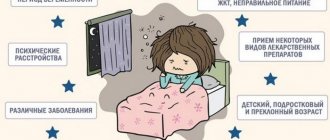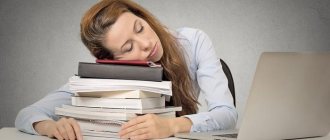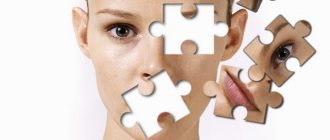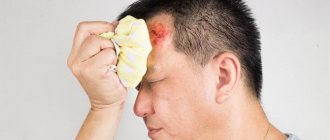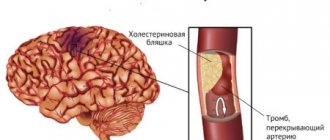Alcohol has not only a negative physical effect on the body, but also a dramatic mental one. Due to the constant state of intoxication, the patient’s nervous system undergoes changes. As a result, after stopping binge drinking, restoration of this part of the body takes a considerable amount of time and effort. And most often during this period, the patient is tormented by the question of how to fall asleep after a binge with a restful sleep that will restore the body’s strength.
Important: often, to induce sleep, the patient takes sedatives or sleeping pills. In this case, an almost instant result is expected, which in principle cannot be. Therefore, the patient takes more pills than the specified dose, which can lead to unexpected consequences and even death.
Causes of sleep disorders
Poor sleep and insomnia are observed due to the toxic effects of ethyl alcohol on the body. After alcoholic drinks:
- normal sleep duration is reduced;
- the heartbeat quickens, which is why a person cannot sleep normally;
- as a result of drinking large amounts of alcoholic beverages, oxygen starvation of the brain develops;
- the deep sleep phase is disrupted, making proper rest impossible;
- the so-called restless legs syndrome occurs, involuntary trembling of the hands;
- causeless anxiety, fear, tension increases;
- a person wakes up from even the slightest sound;
- auditory and visual hallucinations develop.
Insomnia
Insomnia can also occur due to alcohol withdrawal syndrome. During a period of prolonged drinking, a person remains in an excited state for a long time. After you stop drinking alcoholic beverages, various phobias appear, preventing you from falling asleep peacefully.
Due to chronic alcohol intoxication, the following develop:
- headache;
- arterial hypertension;
- visual and auditory hallucinations;
- chronic fatigue;
- disruption of the gastrointestinal tract.
They also contribute to the development of insomnia after alcohol. The problem is further aggravated by smoking and watching films that stimulate the nervous system.
Causes of insomnia due to alcohol abuse
Since ancient times, alcohol has been used by people as a sleeping pill and a sedative. Small doses of intoxicating drinks can cause euphoria and act on the body like antidepressants.
The situation is completely different with those people who drink alcohol regularly and are at the same time dependent on it. In this case, they are not able to enjoy good sleep for a long time, and sometimes for the rest of their lives. What causes insomnia during heavy drinking? Clinical studies have provided an answer to this question. Their conduct made it possible to confirm the fact that alcohol deeply and comprehensively destroys a person’s sleep.
At the very first stages of alcohol abuse, while there is still no addiction to it, intoxicating drinks relax. At the same time, they make falling asleep much easier. Because of this, a person gets the misleading impression that with the help of a glass he will definitely solve the problem with a night’s rest. However, such effects disappear after 3-7 days of regular drinking. Insomnia develops due to the fact that the body develops resistance to ethanol. Relaxation and easy immersion in sleep is replaced by excitement. A person tries to fall asleep, but cannot do so.
What causes insomnia during heavy drinking? The fact is that alcohol becomes the main cause of the development of the disease, as a result of which oxygen starvation develops in the body and nerve cells begin to die. An antisocial lifestyle of a person leads to:
- violation of the cyclicity of time of day (day and night);
- disruption of the natural rhythm of the biological clock;
- poor and episodic nutrition;
- insufficient intake of minerals and vitamins into the body.
Alcoholic insomnia has its own characteristics. It directly depends on the “experience” of drinking. The larger it is, the more severe and longer lasts the condition in which the patient cannot close his eyes. What is this connected with? The fact is that the body of an “experienced” alcoholic is already quite damaged. In this regard, he is no longer able to resist regular poisoning with ethyl alcohol, which is still observed in a person who has been in the clutches of the “green serpent” for a relatively short time.
Types of alcoholic insomnia
Doctors distinguish the following types of insomnia in alcoholism:
- Problems falling asleep. Against the background of excessively consumed ethanol, a person develops anxiety. Long-term problems with sleep lead to nervous overexcitation or, conversely, fearfulness. At this stage, minor pain in the joints is typical.
- Restless sleep. During the night the person often wakes up. He may have nightmares.
- Insomnia. A person sees various hallucinations that interfere with sleep. A nervous disorder develops against the background of a severe hangover.
- Idiopathic insomnia occurs due to prolonged or constant use of alcoholic beverages. The disease is characterized by a high risk of developing alcoholic delirium and nervousness.
Insomnia from alcohol is caused by a mental disorder that occurs in advanced forms of alcoholism.
Water treatments
How to sleep after a binge? To do this, it is recommended to visit a bathhouse or sauna. However, only those people who do not have problems with blood pressure or heart can do this. A visit to a bathhouse or sauna will help remove residual alcohol from the body and relax muscles. All this will help induce sleep.
A contrast shower will also help alleviate the state of increased excitability. The result will be noticeable within ten minutes after the procedure. If it is not possible to take a contrast shower, then it is recommended to pour cold water over the patient’s head or wrap it with a towel soaked in it.
What to do if you can’t sleep after drinking alcohol?
A person can restore sleep after drinking alcohol without resorting to medications. Their use must be consistent with medical recommendations. The following tips will help you fall asleep at home:
- For headaches, it is advisable to drink mint tea. You should not take analgesics or non-steroidal anti-inflammatory drugs, because in combination with alcohol they are very toxic.
- Due to dehydration, you should drink plenty of fluids.
- If your health allows, you can take a walk in the fresh air before going to bed.
- If difficulty falling asleep is combined with nausea, you can drink activated charcoal or chicken broth.
Chicken bouillon
To remove poisons from the body, doctors recommend doing a cleansing enema. A bathhouse will help combat sleep disturbances due to alcoholism. However, it should not be visited by people with cardiovascular pathologies and arterial hypertension.
Physical activity
How to fall asleep quickly after drinking? Sound sleep will bring physical labor to a person. Anyone who is experiencing insomnia is advised to start doing exercises or cleaning the house. However, it is worth keeping in mind that significant physical activity can only cause harm. The heart, as well as other organs that are poisoned by alcohol, are not able to withstand additional efforts. If it becomes difficult to do the exercises, they can be replaced with walks in the fresh air.
Insomnia that occurs after heavy drinking
Insomnia after binge drinking occurs due to the human body's reaction to alcohol. At the beginning of binge drinking, it is still stable, but if a person does not stop drinking alcohol, the symptoms of insomnia increase. After a binge, a patient with alcoholism experiences sleep accompanied by anxiety and even screams.
Other signs of insomnia following heavy drinking:
- increased anxiety;
- causeless fear;
- chronic fatigue, loss of strength;
- daytime sleepiness;
- drowsiness and mental retardation.
Over time, a person who constantly drinks alcohol loses his normal biorhythms and disrupts his usual daily routine.
Hospitalization
How to sleep after a binge? Assistance to the patient (with his consent) can also be provided in an inpatient setting. And if at home specialists conduct an accelerated course of cleansing the body, then in a hospital setting more diverse and effective techniques are used. Among them:
- Plasmapheresis. This procedure is a cleansing of toxic elements from the blood plasma, as well as the introduction of protein and salt compounds into it.
- Rehabilitation treatment. It includes psychotherapy, physiotherapy and nutritional therapy.
- Biological intestinal detoxification.
How to restore sleep after binge drinking?
It will not be possible to quickly restore sleep after a binge, because there is a large amount of toxic breakdown products of alcohol in the blood. It takes approximately 4 days to completely cleanse the body.
To remove toxins, it is important to cleanse the stomach by artificially inducing vomiting. After this, it is advisable to take enterosorbent (activated carbon tablets or Polysorb).
Before going to bed, you need to ventilate the room and drink herbal tea from plants that have a calming effect.
The dangers of drinking alcohol
Alcohol, as is known, is a strong poison for the human body. Only in small doses do alcoholic drinks cause short-term euphoria. When they are taken frequently, and even in large quantities, not only the physical body is destroyed. Alcohol consumption also negatively affects mental health.
Medical research has proven that severe intoxication is caused by poisoning of the body with the breakdown products of alcohol. The fact is that the liver becomes unable to cope with intoxication, which is why the functioning of all systems is disrupted. Disruptions also occur in the functioning of the central nervous system. A person who abuses alcohol becomes overexcited. At the same time, a huge amount of hormones are released into the blood, including adrenaline. It is with him that the state of increased pugnacity and aggressiveness, which is so characteristic of an alcoholic, is most associated.
In cases where a person goes on a drinking binge, a huge amount of alcohol enters his bloodstream. The body is simply unable to cope with such volumes. For clarity, you can compare a person with a computer. Moreover, alcohol is a virus that infects all PC systems, and also disables the processor itself, that is, the nervous system.
Treatment of pathology
Treatment of a person who cannot sleep after drinking alcohol is carried out with the help of medications and folk remedies.
Treatment
What can you take for insomnia?
If a person cannot sleep after drinking alcohol, he needs to take sedatives and sedatives. You should not use sleeping pills: they have a negative effect on the liver.
The following sedatives help restore sleep:
- Afobazole;
- Novopassit;
- tincture of motherwort or valerian;
- Biotredin;
- Persen;
- Donormil;
- Sonilyuks;
- Zorex.
These drugs are sold in pharmacies without a doctor's prescription. Sleep after them will be fully restored in a few days.
After a binge, folk remedies help. It is useful to take decoctions of medicinal herbs - mint, lemon balm and motherwort. Brine is a good remedy for a hangover. It is recommended to include the following vegetables and fruits in your diet:
- cabbage;
- lemons and oranges;
- tangerines;
- currants;
- bananas;
- carrot;
- plums
You can get rid of sleep disorders with the help of:
- tea from hop cones;
- warm milk with honey;
- rosehip decoction.
What is prohibited?
After heavy drinking, the following drugs are strictly prohibited:
- Phenazepam, Elenium, Sebazone and other tranquilizers. They cause dangerous side effects: depression, psychosis, memory impairment. Phenazepam without a doctor's prescription is extremely dangerous.
- Phenibut. This medicine belongs to tranquilizers and nootropic drugs. It is forbidden to take it during a hangover.
- Corvalol and Valocordin, as well as other drugs with phenobarbital. In combination with alcoholic drinks, these drugs lead to damage to the central nervous system and liver. In severe cases, coma may develop.
- Paracetamol and Citramon. These pills after drinking alcohol lead to severe liver damage.
What medications can be used to regulate sleep?
If the matter does not concern long-term drinking bouts, when medical assistance is required, then dealing with insomnia is not difficult, especially if it occurs from a hangover when drinking alcoholic beverages. How to get rid of insomnia after drinking? First of all, you need to take care of relieving the condition, relieving withdrawal symptoms and comprehensive detoxification of the body. Usually, after drinking a lot of alcohol, you get a severe headache. You can eliminate unpleasant pain using the following medications, such as:
- Analgin;
- Ketorol;
- Zorex;
- Mexidol;
- Aspirin.
This method of eliminating pain, such as taking Citramon or Paracetamol, is not applicable, since these drugs negatively affect the condition of the liver, which already suffers from the toxic effects of ethyl alcohol. sedative hypnotics should be used with extreme caution and only as prescribed by a doctor This rule especially applies to the drugs Elenium, Diphenhydramine, Valium Roche. There are more gentle analogues that improve sleep and these are the following types of medicines:
- Motherwort tincture;
- Glycine;
- Novopassit;
- Valerian tincture;
- Biotredin.
These medications are virtually harmless, inexpensive and quite effective. To stabilize the functioning of the central nervous system, they should be used before bedtime. The therapeutic effect can be felt within a couple of days after consumption. It should be noted that the effect of the drugs is cumulative . It is necessary to indicate recommendations when taking medications:
- You should first stop drinking alcoholic beverages and carry out a comprehensive detoxification of the body;
- You cannot take sleeping pills and sedatives together at the same time;
- You should follow all medical recommendations and doctor’s orders.
It is important to say that people often neglect the rules of detoxification. For example, a person begins to use activated carbon in unlimited quantities, believing that it is completely harmless. This is not entirely true. Enterosorbents, including activated carbon, take away not only harmful substances and toxins formed during the breakdown of ethyl alcohol, but also vitamins along with micro- and macroelements, which can at least lead to the appearance of a bacterial imbalance in the intestines. Therefore, it is optimal to calculate the dose of tablets in relation to your weight.
Emergency medical care
In some cities, you can call drug treatment specialists who can help you quickly break out of binge drinking and get rid of alcohol-induced insomnia. For this purpose, detoxification measures are carried out. The patient is given droppers containing drugs to cleanse the blood. These are mainly solutions of folic acid, sodium chloride and glucose.
IV
Specialists at private clinics administer to patients, in addition to these medications, vitamins and safe sleeping pills.
The help of a narcologist has a positive effect on a person. Him:
- the condition stabilizes;
- the feeling of “withdrawal” goes away;
- the functioning of the nervous system is normalized;
- pulse and blood pressure stabilize;
- nausea is eliminated.
Treatment with folk remedies
Folk remedies for insomnia after heavy drinking can also be used. A variety of folk methods have been tested for centuries, and they work. The main advantage is safety and ease of use. In particular, you can use decoctions and tinctures of medicinal herbs that have high therapeutic effectiveness. Herbs such as:
- Motherwort;
- Valerian;
- Melissa;
- Peppermint.
Herbs can be used individually or mixed into herbs. They are usually used to make decoctions or tinctures that are good for relieving stress, irritation, and fatigue. A simple cucumber pickle, which stabilizes the water-salt balance in the human body, can help you recover from a hangover. Tea brewed from St. John's wort helps improve well-being very well. This drink helps eliminate insomnia and promote healthy sleep.
Among other things, St. John's wort contains active components that activate and stimulate cerebral circulation. Simple black tea with sugar and a slice of lemon also relieves hangovers. You should pay attention to organizing proper nutrition, eating foods high in vitamin C, retinol, vitamin A, and tocopherol, such as:
- Oranges;
- Tangerines;
- Lemons;
- Rose hip;
- Black currant;
- Carrot.
Metabolism is improved by consuming fish, vegetable, and weak meat broths. Separately, it should be said about which medications you should not take while binge drinking. Drugs such as Phenazepam or Tazepam, which are classified as powerful tranquilizers, are strictly prohibited for use. You should not take sedative medications without a doctor's prescription. These are Sebazon, Relanium, Nozepam, Elenium. use medications containing phenobarbital (Valoserdine or Corvalol)
with caution Proper sleep is the key to good health, so with the help of the recommendations outlined in the article you can achieve it in a short time.
Consequences of insomnia for the body
Even a well-rested person, after an evening drink, experiences a decrease in labor productivity the next day and an increase in reaction time. People who use alcohol as a sleeping pill at night feel even more tired in the morning.
Prolonged insomnia has the following consequences for the body:
- oxidative stress, which negatively affects short-term and long-term memory;
- increased risk of developing cardiovascular diseases, the most dangerous of which are heart attack and stroke;
- disruption of the process of bone tissue formation;
- metabolic disorders that lead to the development of obesity.
Medicines you shouldn't take to improve your sleep
Once ethanol has entered the body, sufficient time is required for it to be broken down and eliminated. Therefore, only stopping drinking alcohol will help restore sleep.
During an exacerbation, the following medications should never be taken (even if there is a good goal to normalize sleep):
- Phenazepam. It is one of the most powerful tranquilizers. Side effects include psychosis, depressive states, a decrease in intellectual acuity, and disruption of the process of memorizing information. This drug should never be used without medical supervision. The same group includes Relanium, Sibazon, Elenium.
- Products containing phenobarbitals. These include Corvalol and Valoserdin. Uncontrolled use can lead to damage to the central nervous system. The person may fall into a coma. The outcome will most likely be fatal.
Using the right treatment techniques is the key to health. The use of medications under the supervision of a physician will help quickly normalize sleep and speed up the body’s recovery process.
Calling a narcologist
Long-term alcohol consumption and associated insomnia can cause serious mental disorders. If a person experiences severe sleep disorders and a sharp deterioration in health, constriction of the pupils, convulsions, speech and coordination disorders, it is recommended to call a narcologist at home. He can help stabilize the condition of an alcoholic.
The specialist puts in a drip that cleanses the body of toxic breakdown products of ethyl alcohol. The composition of the drug administered to the patient may include:
- solution of glucose, sodium chloride;
- substances that help cleanse the blood;
- sedatives and hypnotics;
- drugs to relieve withdrawal symptoms and relieve seizures;
- vitamins to stimulate metabolic processes.
USEFUL INFORMATION: What to drink for insomnia: what medications and remedies to take
This manipulation allows you to remove the symptoms of alcohol intoxication. There is an improvement in overall well-being, sleep improves, anxiety and hallucinations disappear. The narcologist also draws up an individual scheme for stabilizing a person’s condition and gives recommendations for correcting the daily routine. If necessary, the patient is prescribed injections for dysfunction of internal organs.

